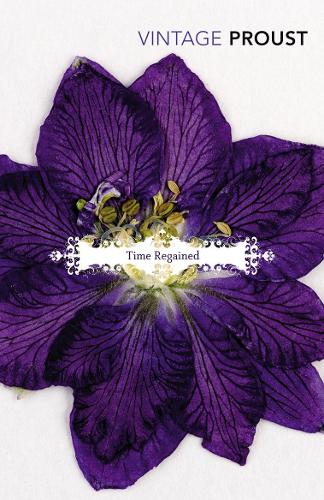
In Search of Lost Time, Vol 6: Time Regained and A Guide to Proust
(Paperback)
Publishing Details
In Search of Lost Time, Vol 6: Time Regained and A Guide to Proust
By (Author) Marcel Proust
Translated by Andreas Mayor
Translated by Terence Kilmartin
Revised by D. J. Enright
Translated by D. J. Enright
Vintage Publishing
Vintage Classics
10th January 1997
5th December 1996
United Kingdom
Classifications
General
Fiction
Modern and contemporary fiction: literary and general
843.912
Physical Properties
Paperback
704
Width 129mm, Height 198mm, Spine 31mm
479g
Description
The definitive translation of the greatest French novel of the twentieth century THE ACCLAIMED FULLY REVISED EDITION OF THE SCOTT MONCRIEFF AND KILMARTIN TRANSLATION Time Regained begins in the bleak and uncertain years of World War I. Years later, after the war's end, Proust's narrator returns to Paris and reflects on time, reality, jealousy, artistic creation, and the raw material of literature - his past life. This edition includes the indispensable A Guide to Proust, compiled by Terence Kilmartin and revised by Joanna Kilmartin.
Reviews
As close to being a definitive version of the great novel as we are likely to get * Scotsman *
Sublime... In Proust's interweaving of romantic delusions, the glory of the descriptions, as the narrator strives to recapture the past, redeems everyone -- John Updike
The way he replicates the workings of the mind changed the art of novel-writing forever...his style is extraordinary, enveloping, captivating * Guardian *
Proust isn't just the most profound of novelists, but the most entertaining, too. No reader ever forgets his most killingly funny scenes... Proust sinks deepest in readers because the book is so exhaustively analytical, so ceaselessly truthful. Not the least of it is the book's heavenly length, so that it inevitably takes over your life for a long stretch... the experience of reading it becomes, in itself, an unforgettable thing * Independent *
Surely the greatest novelist of the 20th century * Sunday Telegraph *
Author Bio
Marcel Proust was born in Auteuil in 1871. In his twenties he became a conspicuous society figure, frequenting the most fashionable Paris salons of the day. After 1889, however, his suffering from chronic asthma, the death of his parents and his growing disillustionment with humanity caused him to lead an increasingly retired life. He slept by day and worked by night, writing letters and devoting himself to the completion of A la recherche du temps perdu. He died in 1922 before publication of the last three volumes of his great life's work.
